If Spain’s current king, Felipe VI, had hoped that the image and reputation of the Spanish Monarchy would improve following the decision of his father, former king Juan Carlos I, to ‘flee abroad’ amid an on-going corruption scandal – it has initially had the opposite affect.
The leader of the left-wing Podemos group, Pablo Iglesias – who is the second deputy prime minister of Spain and the coalition partner in the current PSOE–Podemos government – posted on social media that ‘Juan Carlos de Borbón’s flight abroad is an unworthy act of a former Head of State and it leaves the monarchy in a very compromised position. Out of respect for Spanish citizens and democracy, Juan Carlos I should answer for his actions in Spain and to the people.’
He added, ‘The Spain of the 21st century no longer tolerates corruption and privileges. Any citizen who commits crimes must face the justice.’
‘The claim of impunity for alleged serious crimes by no less than a former Head of State does enormous damage to democracy,’ wrote Iglesias.
La huida al extranjero de Juan Carlos de Borbón es una actitud indigna de un ex Jefe del Estado y deja a la monarquía en una posición muy comprometida. Por respeto a la ciudadanía y a la democracia española, Juan Carlos I debería responder por sus actos en España y ante su pueblo
— Pablo Iglesias 🔻 (@PabloIglesias) August 3, 2020
Former king Juan Carlos I has left Spain amid on-going investigations into a corruption scandal involving alleged secret payments from Saudi Arabia and a bank account in Switzerland [see below].
Unconfirmed media reports have stated that the former king travelled first to Portugal before heading to Abu Dhabi – but some also claim that he will finally establish his place of residence in the Dominican Republic. It has even been reported that he could be heading to New Zealand.
ALSO READ (3 Aug 2020): Juan Carlos I flees Spain amid on-going corruption scandal
Speaking at a press conference following a cabinet meeting on Tuesday, socialist (PSOE) Prime Minister Pedro Sánchez said that his government ‘manifests its absolute respect regarding the decisions taken by the royal household’. He also said that he did not currently know the whereabouts of Juan Carlos I.
In reference to the Spanish monarchy as an institution, he said that ‘institutions aren’t judged, people are judged’.
He also said that the ‘matters between Spain’s Head of State and the head of the Spanish government are discreet and confidential’.
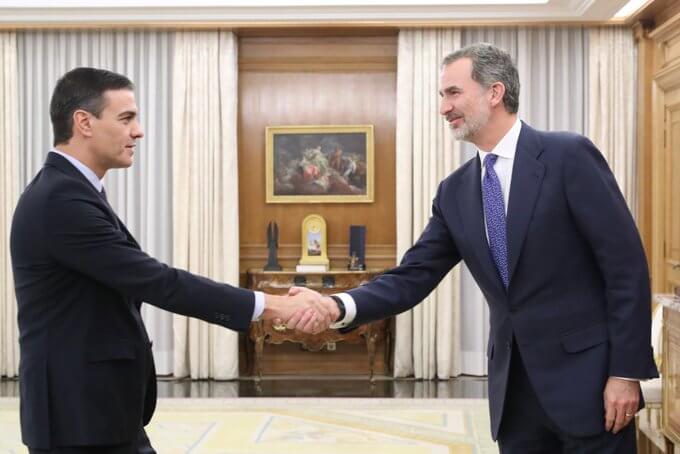
ALSO READ (12 July 2020): ‘There’s no room for impunity,’ says Pedro Sánchez – calling news of former king Juan Carlos I as ‘disturbing’
Pablo Casado, leader of the right-wing People’s Party (PP), and the main opposition group in Spain, said, ‘We respect the decision announced by Juan Carlos I and reaffirm the recognition of his work as [former] Head of State and his contribution to the transition, the promulgation of the Constitution and the construction of a social, democratic and legal state in Spain’.
‘At the same time,’ Casado added, ‘we express our support for the exemplary work of king Felipe VI at the service of all Spaniards, and the essential role of the crown as a symbol of the unity and historical continuity of the Spanish nation.’
Spain’s far-right Vox party, meanwhile, tweeted to state that, ‘The illegitimate government of Sánchez and Iglesias is turning a personal decision of Juan Carlos I into an opportunity to evade its responsibilities and the criminal cases that will come for its criminal management of the [Coronavirus] pandemic.’
In Catalonia, president Quim Torra had one word for Felipe VI on Tuesday: ‘abdicate’.
Torra also announced that he would be asking the speaker of the Catalan Parliament to organise a debate on the matter. On Monday, Torra had tweeted that it was a ‘monumental scandal’ and accused the PSOE-Podemos government of ‘knowing [the former king’s] flight plans for weeks and not doing anything to stop him’.
The Catalan government’s vice president, Pere Aragonès, compared the situation of Juan Carlos with that of the Catalan politicians who went into exile to avoid trial and possible jail for their role in the 2017 independence bid: ‘While some go into exile for defending democracy and calling a referendum, others do it because they’re corrupt, like Juan Carlos I.’
The Mayor of Barcelona, Ada Colau, tweeted that, ‘Corruption must be prosecuted’ and that there should be a ‘referendum [to see if there is enough support] for a monarchy. Allowing Juan Carlos I to flee would be a fraud against democracy and all Spanish citizens.’
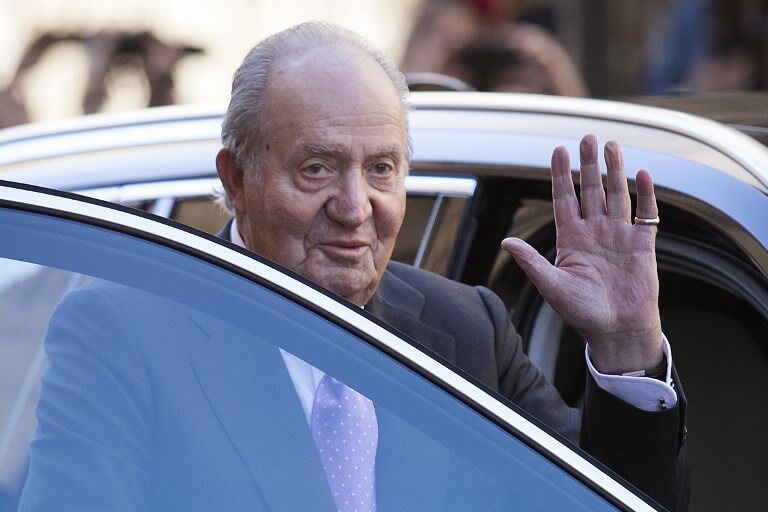
Statement issued by Royal Household
On Monday, the royal household in Madrid released a statement containing the text of a letter from Juan Carlos I to his son and current king, Felipe VI, explaining briefly his decision to move abroad, leaving the Zarzuela Palace in Madrid, where he has lived for the last 58 years.
ALSO READ (8 June 2018): Supreme Court prosecutor to investigate former king Juan Carlos I
The decision to move abroad comes after Swiss and Spanish prosecutors opened an investigation into bank accounts allegedly held by Juan Carlos in tax havens [see below].
‘Guided by the conviction of providing the best service to Spaniards, to their institutions and to you as king, I communicate to you my considered decision to move, at this moment, outside Spain,’ wrote Juan Carlos.
The official statement also included the response from Felipe VI, who thanked his father for his decision, and said he wished to ’emphasise the historical importance’ of his predecessor’s reign and acknowledge his ‘service to Spain and democracy’.
‘At the same time,’ the statement added, the king wants to ‘reaffirm the principles and values’ on which the monarchy is based, that is ‘within the framework of the Spanish Constitution and the legal system’.
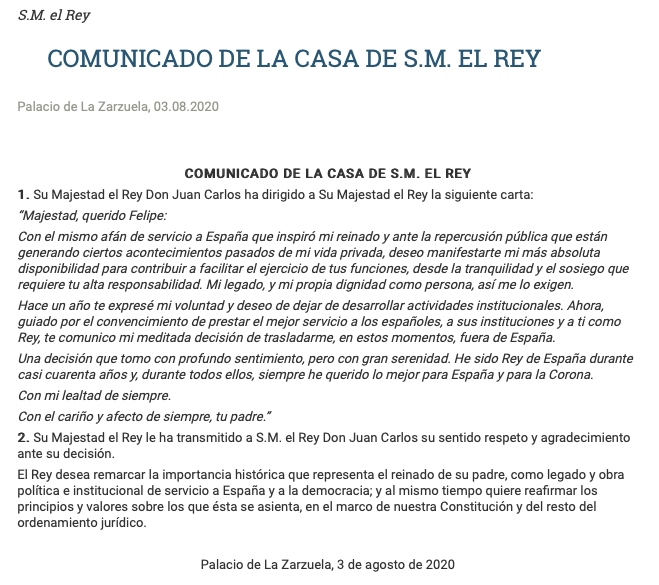
The complete letter read as follows:
‘Your majesty, dear Felipe, with the same zeal to serve Spain that inspired my reign, and faced with the public impact that certain past actions of my private life is causing, I wish to show you my absolute willingness to contribute to helping the exercise of your functions from the peace and tranquility required of your high level of responsibility. My legacy, and my own dignity as a person, demands it.
‘A year ago, I told you of my willingness and desire to stand down from my institutional activities. Now, guided by the conviction to provide the best service to Spaniards, its institutions and to you as King, I am informing you of my well-considered decision to move away from Spain.
‘It is a decision I take, with deep feeling but great calm. I was king of Spain for 40 years and during all those years I have always wanted the best for Spain and the Crown. With my loyalty always. With great affection, you father.’
According to the press release from the royal household, Felipe VI told his father of his ‘respect and appreciation’ for the decision:
‘The king wants to highlight the historical importance that his father’s reign represents, as a legacy, political work and institutional service to Spain and democracy; and also to reaffirm the principles and values that are founded in the framework of our Constitution and the rest of the legal system,’ the press release concluded.
After the statement was released Juan Carlos’ lawyer also stated independently that although his client would no longer be in Spain, he would still be available to help the public prosecutor with its investigation in any way possible.
Investigation into former king
Juan Carlos I is under investigation by the Supreme Court for allegedly receiving commissions in exchange for interceding that a Spanish consortium won a contract to build a high-speed train link to the city of Mecca, in Saudi Arabia.
While the Spanish Constitution states that a king cannot be judged by any means, Juan Carlos’ abdication in favour of his son, Felipe VI, in June 2014 apparently put an end to his immunity.
On 14 March, British newspaper The Telegraph published revelations that Felipe was named as a beneficiary for an offshore fund allegedly containing 65 million euros. The next day, the king relinquished his father’s legacy and withdrew his allocation from the royal family’s payroll.
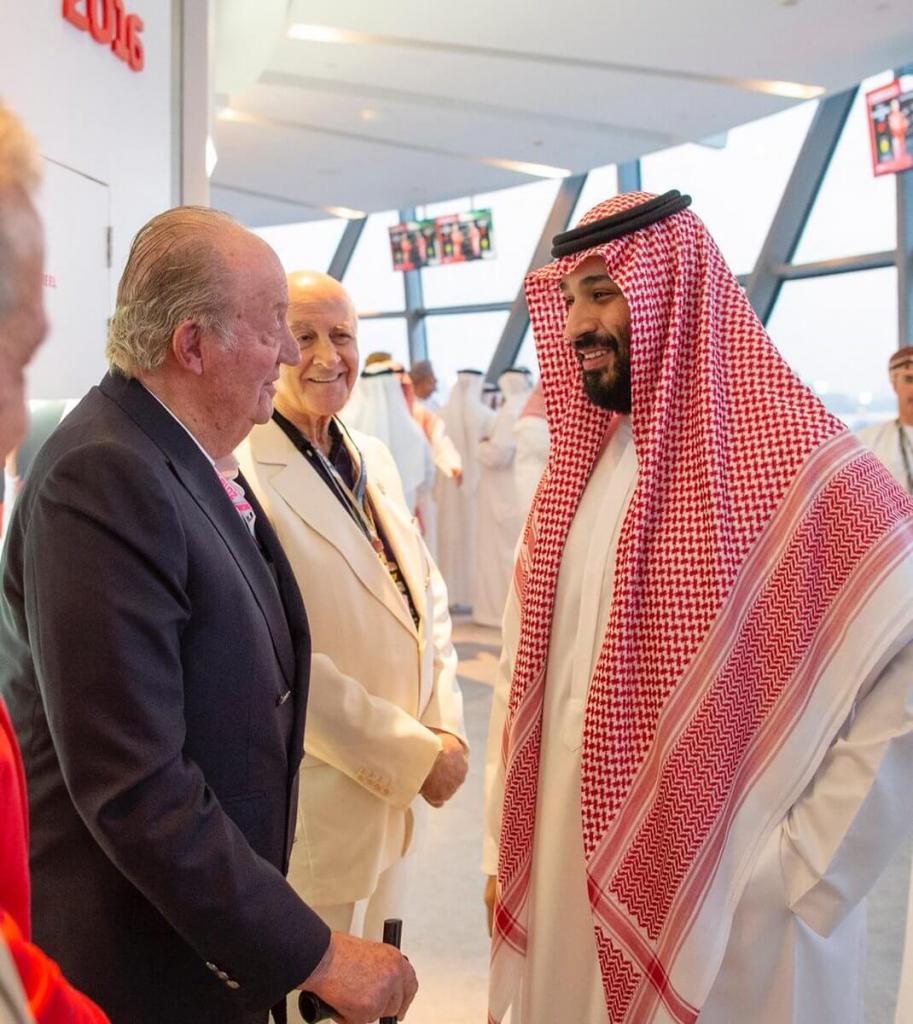
In May, media in Spain then reported that Juan Carlos I was given 1.7 million euros in cash by Bahrain’s sultan, Hamad bin Isa al Jalifa, in 2010.
ALSO READ (3 May 2020): Former Spanish king deposited $1.9m cash from Bahrain in Switzerland, claims report
In July, Spanish Prime Minister Pedro Sánchez said he was open to an amendment of the constitution to limit the legal immunity of public officials, including the king.
As the corruption-ridden legacy of king emeritus Juan Carlos I continues to haunt the Spanish monarchy, calls to strip the crown of its constitutional inviolability have grown louder.
Also in July, Barcelona Mayor Ada Colau called the Spanish monarchy ‘corrupt’ and called for a referendum to remove the monarchy and install a Republic.
ALSO READ (8 March 2020): Spain’s former king, his mistress, and the $100m Swiss bank account
Juan Carlos – Franco’s successor – transition to democracy
Juan Carlos de Borbón is the grandson of Alfonso XIII, the last king of Spain before the abolition of the monarchy in 1931 and the subsequent declaration of the Second Spanish Republic.
Born in Rome on 5 January 1938, Juan Carlos was just 10 years old when he was put on a train to Spain. His father had agreed to have him educated under dictator Francisco Franco in the hope of one day seeing him sit on the throne himself.
Juan Carlos then spent 27 years under the shadow of Franco, growing up in a series of military academies. In May 1962 Juan Carlos married Sofia, a Greek princess.
With Franco’s blessing, the couple settled at the Zarzuela Palace near Madrid and had three children: Elena, Cristina and Felipe, who as male heir bypassed his elder sisters to the throne – and is now the present king of Spain, as Felipe VI.
Appointed by Franco as his political heir (who passed over Juan Carlos’s father, Juan de Borbon), Juan Carlos was long hailed for contributing to Spain’s transition to democracy following the dictator’s death in 1975. He took the throne within days after Franco died, in November 1975 – the first crowned head of state in 44 years, becoming Juan Carlos I.
A new system of a parliamentary monarchy was ushered in, and a new Spanish Constitution was passed by referendum in 1978.
Juan Carlos I was credited with helping to defuse an attempted coup in February 1981 by soldiers who stormed into the Spanish Congress building in Madrid, firing shots and holding MPs hostage for several hours.
The king’s appearance on television that same evening, urging support for the democratic government, was instrumental in blocking the attempt.
‘I knew the soldiers were going to agree because I had been named by Franco and was their commander-in-chief,’ he later remarked. He knew most of the officers from his own military training.
Despite the failed coup helping to endear him to the Spanish people, the king’s image suffered greatly in later years.
Whilst rumours of his numerous affairs were largely overlooked or unreported by the Spanish media for many years, his real decline started in 2012, after he accepted a luxury elephant-hunting trip to Botswana, paid for by a Saudi entrepreneur, during a very tough recession in Spain.
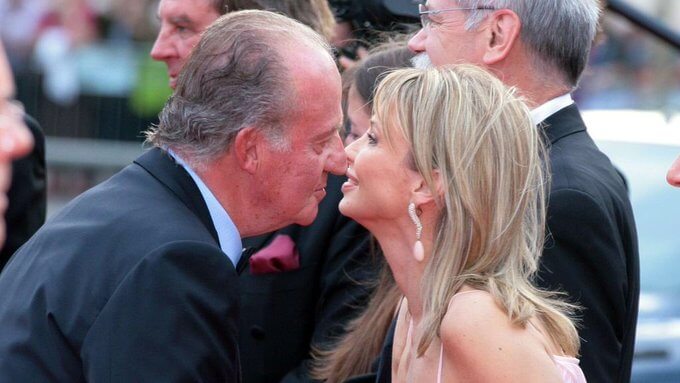
He was accompanied on the trip by his former German mistress, Corinna zu Sayn-Wittgenstein, which only came to light because he broke his right hip and was flown home for surgery. Juan Carlos I made a public apology as he emerged from hospital on crutches.
Between May 2010 and November 2013, he had surgery nine times, including two operations on his right hip and three on his left.
The 2012 incident in Botswana damaged the Spanish monarch’s reputation and is widely seen as the reason for his decision to abdicate in 2014 at the age of 76 in favour of his son Felipe VI. He then retired from public life in June 2019.
‘Faithful to the political desire of my father … I wanted to be king for all Spaniards,’ Juan Carlos said in his abdication address, recalling the day of his proclamation as king.
Now facing investigation in Spain and abroad for alleged corruption, he had become an embarrassment to the Spanish Monarchy and also the government.
Juan Carlos I might have helped Spain’s transition to democracy and he also foiled a military coup, but he heads into exile under a cloud of corruption that has now ruined his legacy.
Click here for all our reports on the Spanish Monarchy
ALSO READ (3/8/20): Juan Carlos I flees Spain amid on-going corruption scandal
ALSO READ (12/7/20): ‘There’s no room for impunity,’ says Pedro Sánchez – calling news of former king Juan Carlos I as ‘disturbing’
ALSO READ (8/6/20): Supreme Court prosecutor to investigate former king Juan Carlos I
ALSO READ (3/5/20): Former Spanish king deposited $1.9m cash from Bahrain in Switzerland, claims report
ALSO READ (17/3/20): Financial affairs of former king will not be investigated by Spanish Congress
ALSO READ (8/3/20): Spain’s former king, his mistress, and the $100m Swiss bank account
ALSO READ (26/12/19): Felipe VI: Catalonia is a ‘serious concern’ for Spain
ALSO READ (4/11/19): Felipe VI visit to Barcelona sparks major protests
ALSO READ (25/10/19): Franco removed but ‘Francoism still very present’ argue many
ALSO READ (2/10/19): Court overturns Catalan Parliament resolution to investigate monarchy
ALSO READ (13/9/19): Anti-corruption investigators question ex-mistress of former king
ALSO READ (28/5/19): Former King Juan Carlos to retire from public life (at a bullfight)
ALSO READ (13/3/19): Madrid to take ‘monarchy investigation committee’ to court
ALSO READ (27/2/19): Felipe VI inflammable statue sparks art fair row
ALSO READ (24/2/19): Protests against Felipe VI before MWC inauguration
ALSO READ (20/2/19): Felipe VI: ‘democracy not above respecting the law’
ALSO READ (16/2/19): Spotlight: ‘When you attack Franco, you attack over half of Spain’
ALSO READ (26/11/18): Juan Carlos criticised for meeting Saudi crown prince
ALSO READ (26/10/18): Barcelona City Council: no to monarchy
ALSO READ (16/10/18): Spain’s elite shaken by ‘blackmailer’ cop, Villarejo
ALSO READ (21/8/18): Rapper Valtonyc extradition decision postponed
ALSO READ (17/8/18): Banners against Felipe VI appear in Barcelona
ALSO READ (13/8/18): Pro-independence groups to avoid remembrance event over king’s presence
ALSO READ (6/8/18): King’s attendance at remembrance sparks controversy

